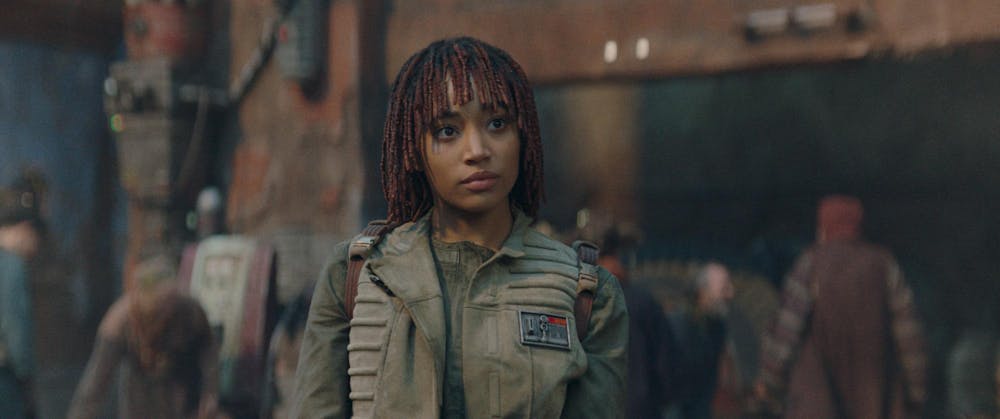"The Acolyte" is the latest in a long line of “Star Wars” spin-off shows, one that has been gaining notoriety over the last month for consistently delivering low-quality performances with each episode. This came as a surprise to me, someone who relatively enjoyed shows such as “Ahsoka,” “Andor” and “Obi-Wan Kenobi.” So, I decided to watch it myself and confirm whether the sentiments of thousands of disappointed fans were valid or not.
Seeing the scathing reviews the series was getting online, I was admittedly a little skeptical going in. While some say that the show was overwhelmed by review bombing, others point towards lackluster production. Getting a rating of 3.5/10 on IMDb, 1.6/5 on Google and an average audience score of 14% on Rotten Tomatoes begs the question: what went wrong?
The premise for “The Acolyte” is simple: A former Jedi padawan reunites with her old master to investigate a series of murders, but they soon realize that the belligerent forces they attempt to confront are far more sinister than they could have ever imagined. The protagonist and former Jedi, Osha (Amandla Stenberg), is shown to be wrongfully convicted for the murder of a Jedi master, where an eyewitness reports the perpetrator as someone who heavily resembles Osha. This leads Osha’s former master, Sol (Lee Jung-jae), to apprehend her and work together to unravel the mystery of the emergent evil behind the murders of several Jedi masters.
On paper, this sounds like an engaging thriller I would love to watch. I have no doubt I would’ve enjoyed this far more had it met its full potential, but the execution destroys any prospect of that.
Characterization and character interactions prove to be some of the show’s biggest flaws, with many characters not constructed according to “Star Wars” lore and present inaccuracies. The actions of integral characters, such as the Jedi, seem to contradict every preceding “Star Wars” project.
The cast of Jedi in “The Acolyte” are acting against their usual nature. Typically portrayed to be calm and collected, the Jedi depicted in “The Acolyte” are headstrong, unruly and tend to jump to conclusions. They ignore dozens of people dying in a fire to save a lone child, let every person in a bar die as they defend themself from an attacker, then surrender when the bartender’s life is threatened, and more. The illogicality of character motives at specific points like these call the writing of the show into question and leads to a never-ending pile of disappointment.
In episode two, an assassin sent to murder Jedi master Torbin gives him a vial of poison which he willingly drinks, without establishing any reason whatsoever for this interaction. The show justifies this by hinting it to be “absolution” for Torbin’s guilty conscience from a past event. Given the context and status quo of Jedi as beings of great position and power, this entire scenario is unreasonable, and thousands of viewers online are of the same opinion.
The series also suffers from poor expression and dialogue. I simply can’t mince words here — the interactions between characters are ridden with wooden dialogue and flimsy arguments. In episode five, a team of Jedi confronting a Sith lord has some of the most awkward dialogue I’ve seen. It sounds stiff and dull, and the emphasis on facial expressions that accompany the dialogue doesn’t help, either. Apart from enjoying the visuals of the show, I often felt like I was watching a theatrical performance rather than a big-budget space opera.
This brings me to my next gripe: the budget. I haven’t touched on this yet, but the fact that a $180 million budget managed to produce this show that is so full of holes is mind-blowing to me.
While this budget served the visual effects of the show, multiple issues, such as the ones I’ve just discussed, have unfortunately overshadowed that aspect.
A budget of $180 million is monstrous, even for Star Wars. To put this in perspective, this is twice the budget of “Obi-Wan Kenobi" and three times the budget of the first season of “Game of Thrones.” For further reference, “Dune: Part Two” had a budget of $190 million, but the difference between the two projects is night and day.
Speaking of “Dune,” “The Acolyte” seems to also have trouble with originality in its writing. The protagonist, Osha, is shown to have spent her childhood in a society that functions as an entirely female community of witches, who operate as a secluded faction in the galaxy and wish to set their own plans in motion. Why does this description sound so familiar? Because it accurately describes the Bene Gesserit faction from “Dune.” In the “Dune” universe, the Bene Gesserit are a female order of “witches” that strive for political gain and hone their own precognitive abilities. The shoddy imitation of this presented in “The Acolyte” is yet another sign that many elements of production were results of minimal effort and could’ve used a lot more work.
The conclusion to the series in episode eight ultimately had no saving grace — not even the two grand cameos were able to reverse the show’s failures from the previous episodes. Episode eight depicts Osha and Mae morally switching places, turning the tables on their definitions of “good” and “evil.” It presents an interesting turn of events, but still left me feeling disappointed about the way the story was handled.
The franchise as a whole will not be able to grow if the same ideas and stories are incessantly replayed. “Star Wars” needs change and new concepts to grow, and shows like “Andor,” “Ahsoka" and "The Mandalorian" have demonstrated this. My hope for future projects of the franchise is that they honor the original films and manage to capture the essence of what makes "Star Wars" so beloved.




